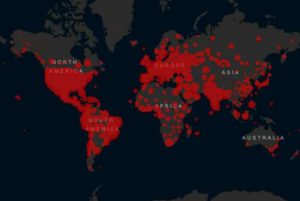
The coronavirus pandemic continues a steady climb as it ravages locations around the world. Almost 14 million global COVID-19 infection cases have been recorded by Johns Hopkins University.
The U.S. continues to lead the world in the number of cases with more than 3.5 million people infected. Brazil comes in second with more than 2 million and India has one million cases.
The U.S. set a daily record for new infections Thursday at more than 75,000 cases, according a New York Times database. The previous record was 68,241 set last Friday (July 10). The U.S. had close to 1,000 deaths Thursday from the virus.
Saying Spain showed “strong resolve” that “changed the course” of the country’s coronavirus outbreak, the chief of the World Health Organization (WHO) said, while paying tribute to the onetime COVID-19 hot spot for reversing “the trajectory of the outbreak.”
WHO Director-General Tedros Adhanom Ghebreyesus said Thursday, “Spain has shown that with political leadership and action, backed by community support, that COVID-19 can be controlled, no matter at what stage virus transmission is at in a country. …From being greatly challenged, Spain has reversed the trajectory of the outbreak.”
In late March and early April, Spain was reporting as many as 10,000 new cases a day.
Tedros gave credit to both the Spanish government and people for adhering to tough restrictions including what the WHO says has been robust surveillance, testing, contact tracing, treatment and isolation.
While hailing the success, Tedros also remembered the Spaniards and others worldwide felled by COVID-19 and warned that it remains a threat even where the emergency appeared to have abated.
The coronavirus shows no sign of easing in Brazil, where the health ministry is reporting more than 2 million cases and more than 1,000 deaths a day.
Brazilian health experts blame the federal government for the high toll.
“The virus would have been difficult to stop anyway. But this milestone of 2 million cases, which is very underestimated, shows this could have been different,” said Dr. Adriano Massuda, a health care professor at Sao Paulo’s Getulio Vargas Foundation university. “There’s no national strategy for testing, no measures from the top … too little effort to improve basic care so we find serious cases before they become too serious, no tracking.”
Although the number of cases appears to be ebbing in some of the larger Brazilian cities, it is now starting to hit places that had been spared.
Brazilian President Jair Bolsonaro, who spent months minimizing COVID-19 as “a little flu,” has tested positive for the virus twice on the last two weeks.
Bolsonaro has encouraged businesses to reopen and pushed local leaders to ease restrictions, saying the lockdowns and other measures are costing Brazilians their jobs.
The government says lockdowns aimed at combating the spread of COVID-19 have forced nearly 523,000 Brazilian businesses to temporarily or permanently close their doors in the first two weeks of June.
A team of U.S. Army doctors and nurses arrived at the United Memorial Medical Center in the city of Houston, Texas to help hospital staff treat coronavirus patients.
“This facility working with the United States military, is something that we asked for,” Texas Democratic Representative Sheila Jackson Lee said Thursday “We have exhausted medical personnel that we’re so grateful to, but we didn’t have enough.”
As New York City health officials did before them, officials in San Antonio have ordered refrigerated trucks to store the bodies of coronavirus victims until they can be buried. Some of the bodies were left on stretchers in hospital hallways for as long as 10 hours because of a shortage of space in the morgue.
More U.S. retail giants are requiring customers to wear face masks in stores. Target department stores, CVS pharmacies and Publix supermarkets joined the list Thursday.
The country’s two largest brick-and-mortar retailers – Walmart and Kroger – announced the policy earlier this week.
Without a national mandate from the White House to wear face coverings in public, it is up to states, cities and businesses to come up with their own policies.
“To be clear, we’re not asking our store employees to play the role of enforcer,” CVS executive Jon Roberts says. “What we are asking is that customers help protect themselves and those around them by listening to the experts and heeding the call to wear a face covering.”
Another trial of the malaria drug hydroxychloroquine has proved it to be ineffective as an early treatment for mild cases of COVID-19, researchers at the University of Minnesota School of Medicine have concluded.
“There is not convincing evidence that hydroxychloroquine can either prevent COVID-19 after exposure or reduce illness severity after developing early symptoms,” said Caleb Skipper, lead author of the study. “While disappointing, these results are consistent with an emerging body of literature that hydroxychloroquine doesn’t convey a substantial clinical benefit in people diagnosed with COVID-19, despite its activity against the coronavirus in a test tube.”
President Donald Trump had hyped hydroxychloroquine as an effective treatment early in the pandemic and said he took the drug himself. He has tested negative for the coronavirus.
After initially approving it as an emergency treatment, the U.S. Food and Drug Administration (FDA) reversed itself once doctors warned of potentially deadly side effects.
The National Football League’s Players Association says 72 NFL players had tested positive for COVID-19 as of earlier this week.
Team training camps are set to open July 28 with the first games of the season scheduled to be played September 10. But the nation’s top infectious disease specialist, Dr. Anthony Fauci, has said it is impossible to predict if NFL teams can play a full 16-game season.
Professional baseball, soccer, hockey, and basketball teams plan to resume or open their shortened seasons within weeks.
Source: VOA
